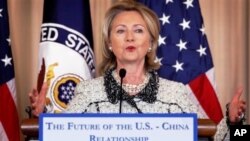Secretary of State Hillary Clinton says the U.S.-China relationship is at a critical juncture, some three decades after the countries formally reopened ties in 1979 and just days before a state visit by Chinese President Hu Jintao. In her speech at the U.S. State Department Friday, Clinton called for transparency and trust as Washington presses for a comprehensive relationship with Beijing.
Clinton said the U.S.-China relationship is as important as any bilateral relationship in the world, between nations that defy simple descriptions such as "friend or rival."
"History teaches that the rise of new powers often ushers in periods of conflict and uncertainty," said Hillary Clinton. "Indeed, on both sides of the Pacific, we do see some trepidation about the rise of China and about the future of the U.S.-China relationship. Some in the region and some here at home see China's growth as a threat that will lead either to Cold War-style conflict or American decline. And some in China worry that the United States is bent on containing China's rise and constraining China's growth, a view that is stoking a new streak of assertive Chinese nationalism. We reject those views."
Watch Mil Arcega's Companion TV Report:
Clinton said the Obama administration is pursuing a threefold strategy. "We are practicing robust regional engagement in the Asia-Pacific, we are working to build trust between China and the United States, and we are committed to expanding economic, political, and security cooperation wherever possible," she said.
The Secretary of State said both countries need to cooperate effectively and meet global obligations. She said this involves firmly and decisively addressing differences, including in the area of human rights.
"Now, I know that many in China, not just in the government, but in the population at large, resent or reject our advocacy of human rights as an intrusion on sovereignty," said Clinton. "But as a founding member of the United Nations, China has committed to respecting the rights of all its citizens. These are universal rights recognized by the international community."
She said the U.S. will press China when it censors bloggers, imprisons activists, and denies religious freedom and the right to peaceful protest.
Clinton said U.S. officials will continue to call for the release of political prisoners, including Nobel Peace Prize winner Liu Xiaobo. She further said a vibrant civil society allows for innovation and exchanges of ideas that will help China address issues such as food safety and pollution.
Yang Jianli, a former Tiananmen Square activist who now lives in the U.S. and works to promote peaceful democracy in China, says Secretary Clinton's comments on human rights should be highly commended.
"She was right in saying that the importance of human rights is not only narrowly for human rights itself, eventually it will have a broad effect in many many fields in China," said Yang Jianli. "It's important for development in China. It's important for the whole world."
Yang, who is also a member of the international legal and human rights counsel for the jailed Nobel Peace Prize winner, says continued calls for the release of Liu and other dissidents help push China toward democracy and reform.
On the economic front, noting that trade between the U.S. and China surpasses $400 billion annually, Clinton said the United States wants China to allow its currency to appreciate more rapidly, end discrimination against foreign companies and protect intellectual property rights. She said China's GDP, while it has expanded from $100 billion to $5 trillion in the past 30 years, it's still only one-third the size of the U.S. GDP.
On the military front, Clinton said the United States wants greater transparency from China as it takes steps to modernize and expand its military.
Clinton underscored China's pivotal role in dealing with a situation that, in her words, has "vexed" the United States - North Korea's provocative actions, including missile and nuclear tests.
"And with China's support, last year we adopted enhanced sanctions in the [United Nations] Security Council," she said. "These efforts showed clearly that when China plays a very constructive part, we can produce results together that send an unequivocal message to North Korea."
But, Clinton said, China needs to play a greater role on the world stage.
"The world is looking to China, and there's a lot of excitement about this, because we think that there are ways that China can be a unique leader in the 21st century," said Hillary Clinton. "Embracing the obligations that come with being a 21st century power will help to realize a future that will give the Chinese people even more, in fact, unimagined opportunities. But that means accepting a share of the burden of solving common problems, abiding by and helping to shape a rules-based international order."
China's president is due in the United States Tuesday.














